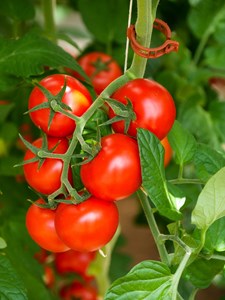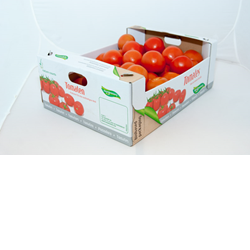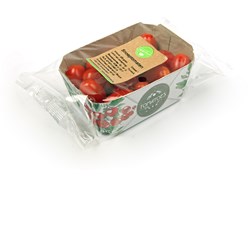Producing paper and cardboard from the fibers in tomato plants is possible.
After the production period of the tomatoes the plants are removed from the field or out of the greenhouse. The plants get shredded and collected in large containers. The shredded pieces of plant matter are most of the time turned into compost. However this could be utilised to produce paper and cardboard.
To produce paper out of the plant matter the plant matter first has to be pre-treated since it is too hard and stiff to press out the fibers right away. The silage process is used to weaken the structure of the plant matter and softening the fibers. The silage process is also a storage for the plant matter which mainly is only available in November and December, while the paper production process is year-round.
After the silage process the plant matter is ready to be pressed so that the fibers are separated from the juice and other organic components. The separated fibers are then dried and used in the process of making paper. In practice the fibers most of the time are too long for effective use.
Therefore another step could be implemented in the process which will cut the fibers into smaller pieces, an so called refiner. In the showcase project eventually around 300.000 boxes were produced with 15% tomato fiber content. In the ideal situation recycled cardboard enriched with the 15% tomato fibers don't need any other virgin fibers (e.g. from trees).
This project was conducted with subsidy from 'clusterregeling' of the province of South-Holland. The involved partners were Bio Base Westland, Duijvestijn tomaten, Frans Zwinkels, Fytagoras, The Greenery, Inholland, Knowledge centre for paper & cardboard, Knowledge centre of plant compounds, Lans, Solidus Solutions, Van Nature, Van Vliet Contrans and Wageningen UR.


A cardboard box for 5 kg of tomatoes.

Packing tray for 250 gr snack tomatoes
During the growth of tomatoes in greenhouses polypropylene (PP) strings are used to keep the plants right up. In some cases also PP clips are used to bind the stems with the strings.While shredding the plants, also the PP parts are shredded. The tiny PP string fibres and clip particles causes problems in the paper and cardboard making process.The question is: how can we get rid of the PP waste in the shredded plant matter.\n(or even better: how can we achieve only a sustainable alternative for PP will be used which causes no problems)
After the silage process the tomato plant matter still contains 60 - 80% moisture. In practise this high moisture level causes blockage of the refiner. The question is: how can we refine the moistured matter whith a high troughput at a reasonable costprice?
In the silage process there is a significant amount of moisture leakage. The moisture contains different compounds which possibly can be used in an other process or product.